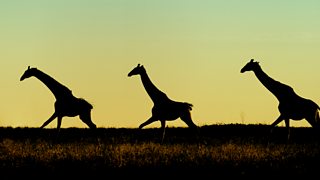Science In Action Episodes Episode guide
-
![]()
How many genes does an Organism Need?
Counting the vital genes in tiny organisms refined by two billion years of evolution
-
![]()
How many Fathers does a Child need?
The more fathers you have, the better your chances of survival, report anthropologists
-
![]()
How Man first arrived in the Americas
Genetic analysis suggests early man arrived from Asia about 18,000 years ago
-
![]()
How Madagascar is protecting its Biodiversity
Madagascar triples area set aside to protect biodiversity
-
![]()
How is the Cloning of Human Cells Regulated?
The ethical debate continues as new regulations about human cloning take effect in the UK
-
![]()
How Insect Pests can be Good for Plants
A bite from an insect pest can induce resistance and protect plants from further attacks
-
![]()
How Human Language started with hand Gestures
Human language probably arose from primates' hand gestures, which are complex and subtle
-
![]()
How Harmful is Lead Pollution?
A survey on effects of lead poisoning published by British Medical Journal
-
![]()
How Ghana's Fish Stocks affect the land Animals
Why the knock-on effect of over-fishing in Ghana is a reduction in wildlife populations
-
![]()
How female Mice keep making Eggs
Germ stem cells have been discovered in the ovaries of female mice
-
![]()
How do Animals reach the right Size?
Discovery of a gene that regulates cell size and growth rate in animals
-
![]()
How did the Moon get its Craters?
What caused the impact craters on the Moon?
-
![]()
How contagious is the Bird Flu Virus?
Bird flu may have passed from daughter to mother, raising fears about further contagion
-
![]()
How close is a Bird Flu Vaccine?
How close is an effective vaccine for bird flu?
-
![]()
How close is a biochemical Weapon against Malaria?
How the malaria parasite "steals" energy from the red blood cells of its host
-
![]()
How Cholera Bacteria turn nasty
Cholera bacterium produces harmful toxin only when it is infected by a virus
-
![]()
How can we predict Earthquakes?
With fears of another earthquake in the Indian Ocean, how good is our warning system?
-
![]()
How Cameroon Lakes build up deadly Gasses
More needs to be done to avoid deadly release of gasses again from two lakes in Cameroon
-
![]()
How Bird Flu spreads
Bird flu is spreading into Europe from wild and migratory birds in the northern tundra
-
![]()
How Babies recognise Language
Babies can recognise language very early, using the left hemisphere of their brain
-
![]()
How Argentine Ants have colonised Europe
Argentine ants have formed a European "super colony"
-
![]()
How Alzheimer's Disease kills Brain Cells
Alzheimer's disease: caused by a molecular-level malfunction on the surface of brain cells
-
![]()
How a Salmon can spawn Trout
The salmon that spawns trout is the first animal of one species to give birth to another
-
![]()
Hot Scientific Topics of 2003
Reviewing some of the main scientific themes of 2003, and the life of John von Neumann
-
![]()
Hormones and Depression in Premenstrual Syndrome
How oestrogen levels affect seratonin levels in premenstrual syndrome
-
![]()
Hopes for a new Type of Vaccine
A new type of vaccine that is hoped to stimulate a different part of our immune system
-
![]()
Hope for a Leishmaniasis Vaccine
Hope for a vaccine against leishmaniasis disease that affects 12 million people worldwide
-
![]()
Hong Kong Bird Flu Virus claims another Victim
More cases of chicken influenza virus in Hong Kong set off international alarm bells
-
![]()
HIV Prevention for Women and Girls
Developing methods of preventing HIV infection for women and girls
-
![]()
HIV Infection at a cellular Level
Possible early HIV treatment based on an immune-system study in Boston


